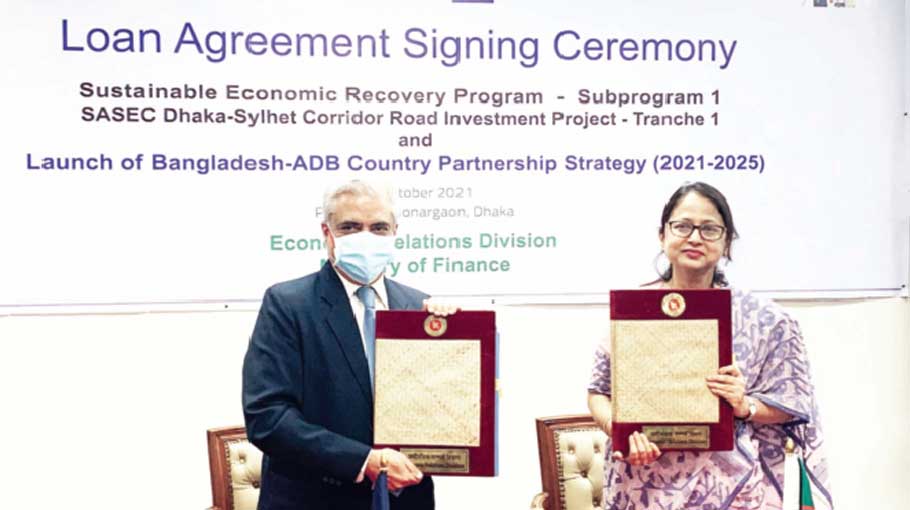Another $250m ADB funds for Bangladesh economic recovery

The Asian Development Bank (ADB) and the Government of Bangladesh on Monday signed agreement for $250 million in policy-based loan to support Bangladesh’s economic recovery following the coronavirus disease (COVID-19) pandemic.
The assistance is under the first subprogram of the programmatic $500 million Sustainable Economic Recovery Program.
Fatima Yasmin, Secretary, Economic Relations Division (ERD), and Manmohan Parkash, Country Director, ADB, signed the loan agreement on behalf of Bangladesh and ADB, respectively at a simple ceremony at a hotel in Dhaka.
“Bangladesh has managed the ongoing COVID-19 pandemic well through the stimulus and incentive packages and expanded social protection programs under a pragmatic policy to support lives and livelihoods,” said Country Director Manmohan Parkash.
Appreciating the Government’s policies for economic recovery, Parkash said, “Rapid implementation of critical reforms for improving public investment and expenditure efficiency, domestic resource mobilization, diversifying the economy, boosting competitiveness, and promoting small enterprises for local-level job creation are critical reforms that need to be implemented expeditiously.”
“I am pleased that these reforms that we are committing today will helpimprove the fiscal headroom to support the aspiration of Bangladesh to become an upper middle-income country by 2031,” Parkash added.
The Sustainable Economic Recovery Program will facilitate a rapid and sustainable recovery from the COVID-19 pandemic, generate employment, and expand economic activities for micro-entrepreneurs and small businesses. This will be pursued through policy reforms that will create fiscal space to enhance public expenditure and support the recovery and growth of cottage, micro, small, and medium-sized enterprises (CMSMEs).
The program will support the government’s planned public investment in education, health, social protection, and infrastructure and help to stimulate economic activities. The program aims to expand the tax base, improve compliance, and strengthen enforcement, rationalize tax exemptions, and modernize tax administration.
The program will widen access to finance for women entrepreneurs, particularly those running CMSMEs, by introducing or modifying refinancing programs and credit guarantee schemes with an earmarked portion for women entrepreneurs. The program will also encourage more women-led start-ups by earmarking 10% of new start-up financing for them.
The COVID-19 pandemic has severely impacted micro-entrepreneurs and small businesses in the country. Limited access to affordable finance is one of the most critical constraints faced by CMSMEs. Only 28% of the larger CMSMEs, or small and medium-sized enterprises, have access to formal bank credit.
Enhancing access to credit for CMSMEs will lower borrowing costs, protect this important segment of the economy, support inclusive growth, and absorb the demographic dividend.



